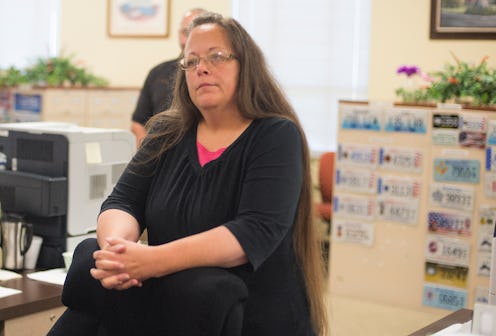News
How Long Will Kim Davis Be In Jail?
A federal judge has ordered that Kentucky clerk Kim Davis be jailed for contempt after her refusal to issue marriage licenses to same-sex couples. In June, the U.S. Supreme Court issued what appeared to be an irrefutable statement on the constitutionality of same-sex marriage. Not so, according to Davis, who has mounted a legal defense that she should not be forced to issue marriage licenses to same-sex couples because it goes against her personal religious beliefs. On Thursday, a federal judge rejected Davis's appeal and ordered that she be jailed for disobedience. How long could Kim Davis be jailed for contempt?
It appears that Davis actually has the power to say how long she will stay in jail and how long her incarceration will be, as the judge's order will lift the moment when the clerk agrees to follow the law and do her job. According to CNN, Bunning ordered that Davis remain in jail until she agrees to comply with the law and begin issuing marriage licenses.
That could take a while, considering Davis's stated views on marriage equality. During the hearing, a lawyer questioned Davis on her definition of marriage and, according to The New York Times, Davis replied that "Marriage is between one man and one woman." The attorney then asked if Davis had the ability to entertain another definition of marriage, to which she replied, "No."
In a hearing Thursday, Davis testified before Judge David L. Bunning that issuing marriage licenses to same-sex couples was a violation of her religious beliefs. Davis, an Apostolic Christian, refused to issue marriage licenses to gay couples in Rowan County, Kentucky, since the Supreme Court's landmark ruling, saying that she was acting "under God's authority."
The American Civil Liberties Union on Monday filed a motion calling on Judge Bunning to hold Davis in contempt, since she has taken "no reasonable steps" to comply with the court's ruling. The ACLU argued that because Davis is a public servant, refusing to issue the licenses to some couples means that the clerk is being paid "for duties she fails to perform." The goal, according to the court documents, did not appear to put Davis in jail, but rather that the judge "impose financial penalties sufficiently serious and increasingly onerous to compel Davis’ immediate compliance without further delay."
Bunning took that argument a step further, calling Davis's reason for not following the court order "simply insufficient." The New York Times quoted Bunning thusly:
The court cannot condone the willful disobedience of its lawfully issued order. If you give people the opportunity to choose which laws they follow, that's what potentially causes problems.
In the interim, Davis will get to keep her official position. As an elected official in Kentucky, Davis cannot be fired for failing to comply with the duties of her office; she could only be impeached, TIME Magazine reported. University of Kentucky law professor Scott Bauries told TIME that removing Davis from office would take a vote by the conservative Kentucky legislature. "She’s probably got enough supporters that she wouldn’t be impeached anyway," added Bauries.
